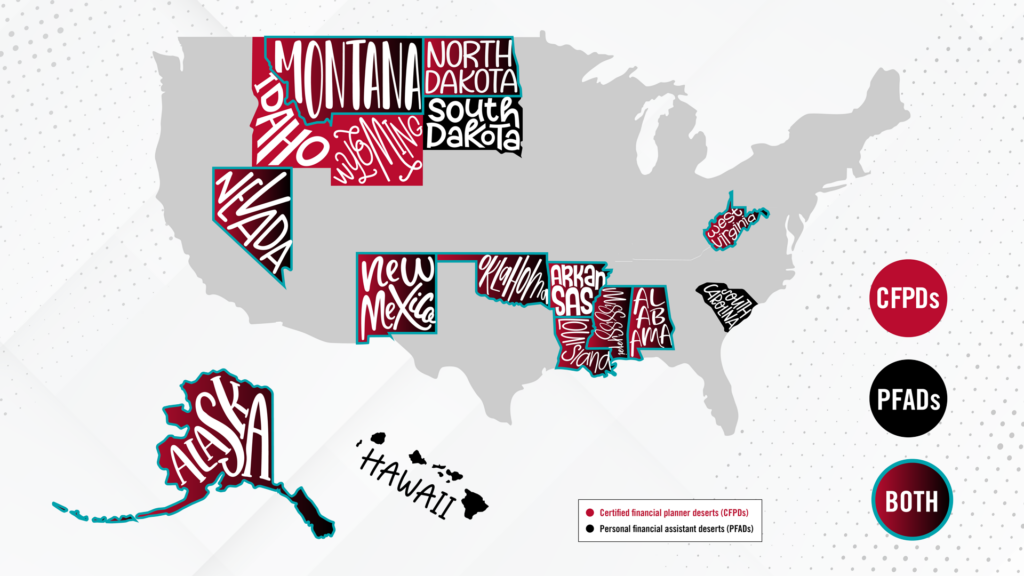A new study from the University of Georgia found many states within the Southeast and West qualify as financial advice deserts—a new concept coined by researchers to describe a low proportion of financial planners or planning institutions where people are less likely to understand their financial options or save for the future.
Researchers found that approximately 10% of Americans live in an area that constitutes a financial advice desert.
As retirement cashflow continues to move away from company-paid pensions and more into the hands of individual workers, this planning grows in importance for individual and community financial health, said researcher Swarn Chatterjee.
“If people do not save enough, it is going to affect everyone,” said Chatterjee, Bluerock Professor of Financial Planning in UGA’s College of Family and Consumer Sciences and lead author of the study. “This is important to understand right now because one of the largest cohorts of the population, the baby boomers, continue to retire in large numbers.”
Many retirees underestimate how much money they need to retire, Chatterjee said, and access to certified financial planners or personal financial advisors can improve saving habits.
To identify financial advice deserts, Chatterjee and co-author Lu Fan compared overall state population to the number of certified financial planners and personal financial advisors. States with the lowest proportion of financial planning professionals compared to population were classified as certified financial planner deserts (CFPDs) or personal financial advisors deserts (PFADs), respectively, and both categories were considered financial advice deserts.
“We focused on financial planning firms because at least if you have access to financial planning firms, people can seek that advice if they need to. That information also percolates throughout the community, even if individuals don’t have direct access,” Chatterjee said. “For example, if someone’s cousin sees a financial planner, they can pass along some of that information. It at least has a chance to flow.”
Less access, less planning
Residents of financial desert states were less likely to own a retirement account or contribute to retirement accounts and were less likely to accurately estimate their retirement needs. Overall, this indicated worse financial planning and future financial health.
And all of this was especially true for sparsely populated areas and areas with a large minority population, Chatterjee said. These communities tend to be under-resourced and lack some of the social support systems found in higher population or higher wealth areas, meaning a lack of financial planning could exacerbate existing strains.
“In communities where people have even less access to financial advice, these problems will be amplified, so the people who need the help the most are less likely to get it. What we are finding is that for minorities, the effect is even more intense,” Chatterjee said. “Minority households are less likely to participate in retirement in general, but they’re even less likely to participate in these desert areas.”
In a recent study, UGA researchers found that many states in the Southeast and Midwest qualify as financial advice deserts. States identified as certified financial planner deserts (CFPDs) and/ or personal financial advisor deserts (PFADs) included Alabama, Alaska, Arkansas, Hawaii, Idaho, Louisiana, Mississippi, Montana, Nevada, New Mexico, North Dakota, Oklahoma, South Dakota, South Carolina, West Virginia and Wyoming.
CFPDs included Alabama, Alaska, Arkansas, Idaho, Louisiana, Mississippi, Montana, Nevada, New Mexico, North Dakota, Oklahoma, West Virginia and Wyoming, while PFAD states were Alabama, Alaska, Arkansas, Hawaii, Louisiana, Mississippi, Montana, Nevada, New Mexico, Oklahoma, South Dakota, South Carolina and West Virginia. States categorized as CFADs and PFADs included Alabama, Alaska, Arkansas, Louisiana, Mississippi, Montana, Nevada, New Mexico, Oklahoma and West Virginia.
Improving financial inclusion through resources
Even within financial advice deserts, however, homeowners and individuals with other advantages—higher financial literacy, higher income, full-time employment or higher education—were more likely to plan for retirement. This, Chatterjee said, shows that education and expanded resources might assist in more financial planning and better retirement preparedness.
“Having some intervention in terms of financially educating people could be useful so people can understand the importance of saving. But the greater good is that it will create more financially resilient communities,” he said.
On a more local or individual level, programs promoting financial literacy at schools or in workplaces could provide a foundation for retirement planning, Chatterjee said. Policy change could also improve access to financial advice, either through expanded broadband access and virtual financial advice providers or through tax incentives for institutions entering these financial advice deserts.
Financial planning is something everyone should consider, Chatterjee said. Events of the last 20 years, including the dot-com crisis, the recession, the COVID pandemic and stock market downturns, have negatively affected portfolios. And as more individuals become reliant on 401(k) programs or individual retirement plans rather than pensions, financial literacy and guidance on retirement planning continue to grow in importance.
“Not everyone who is working has access to a 401(k) through their employer, and if they are in an hourly job, they may or not have any access to that,” Chatterjee said. “But anyone can save if they have income.”
Credit: Source link




